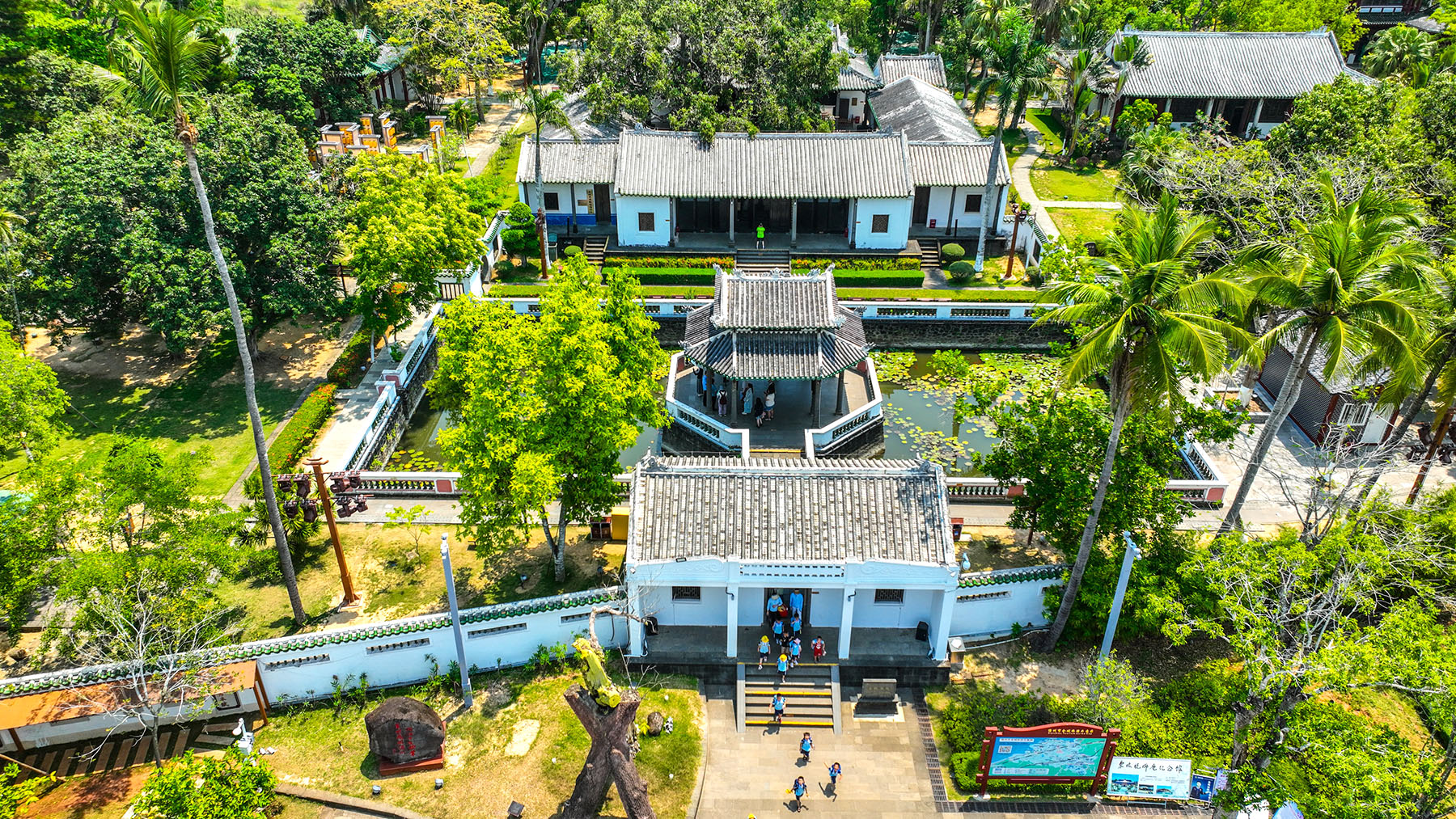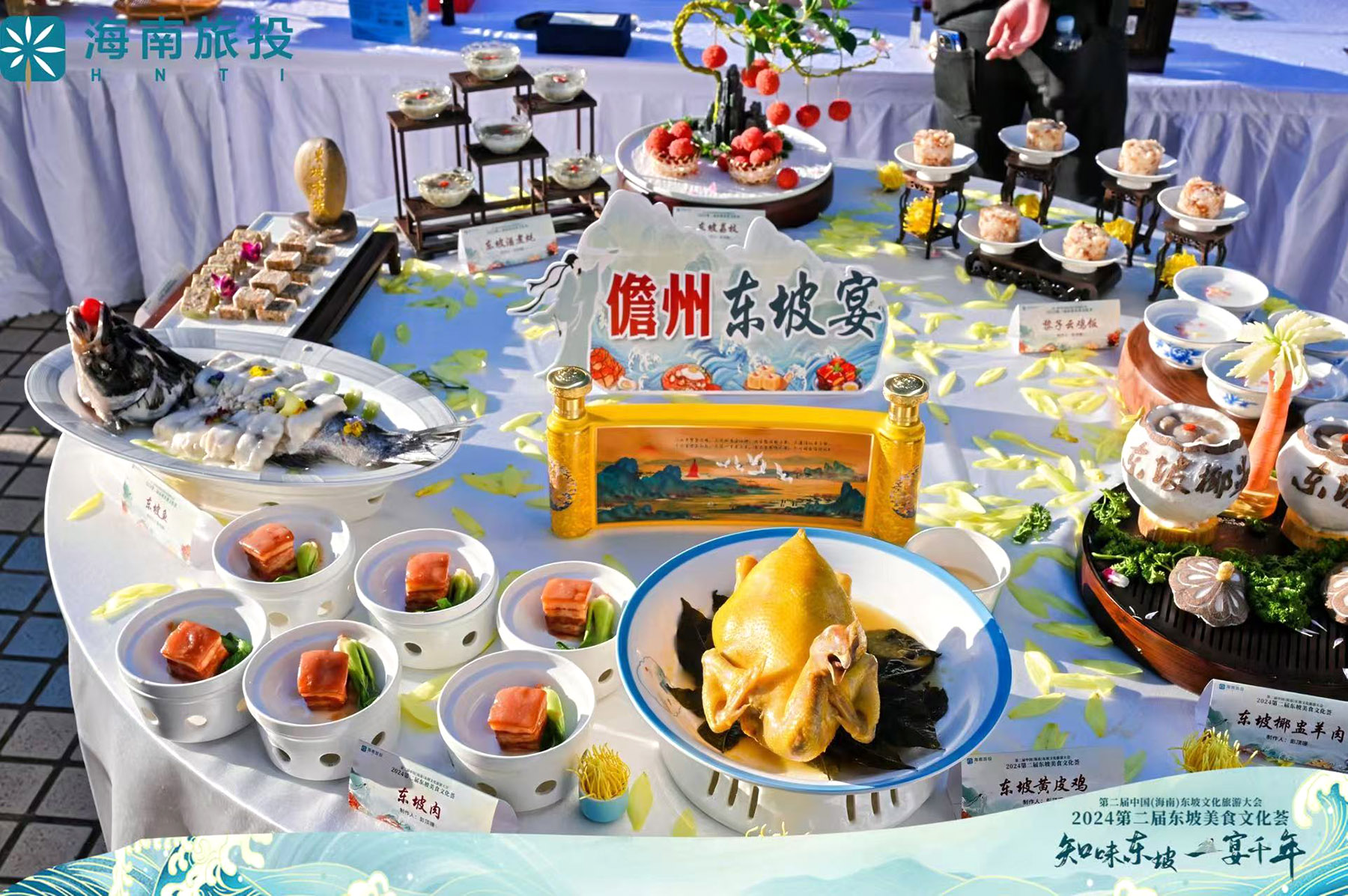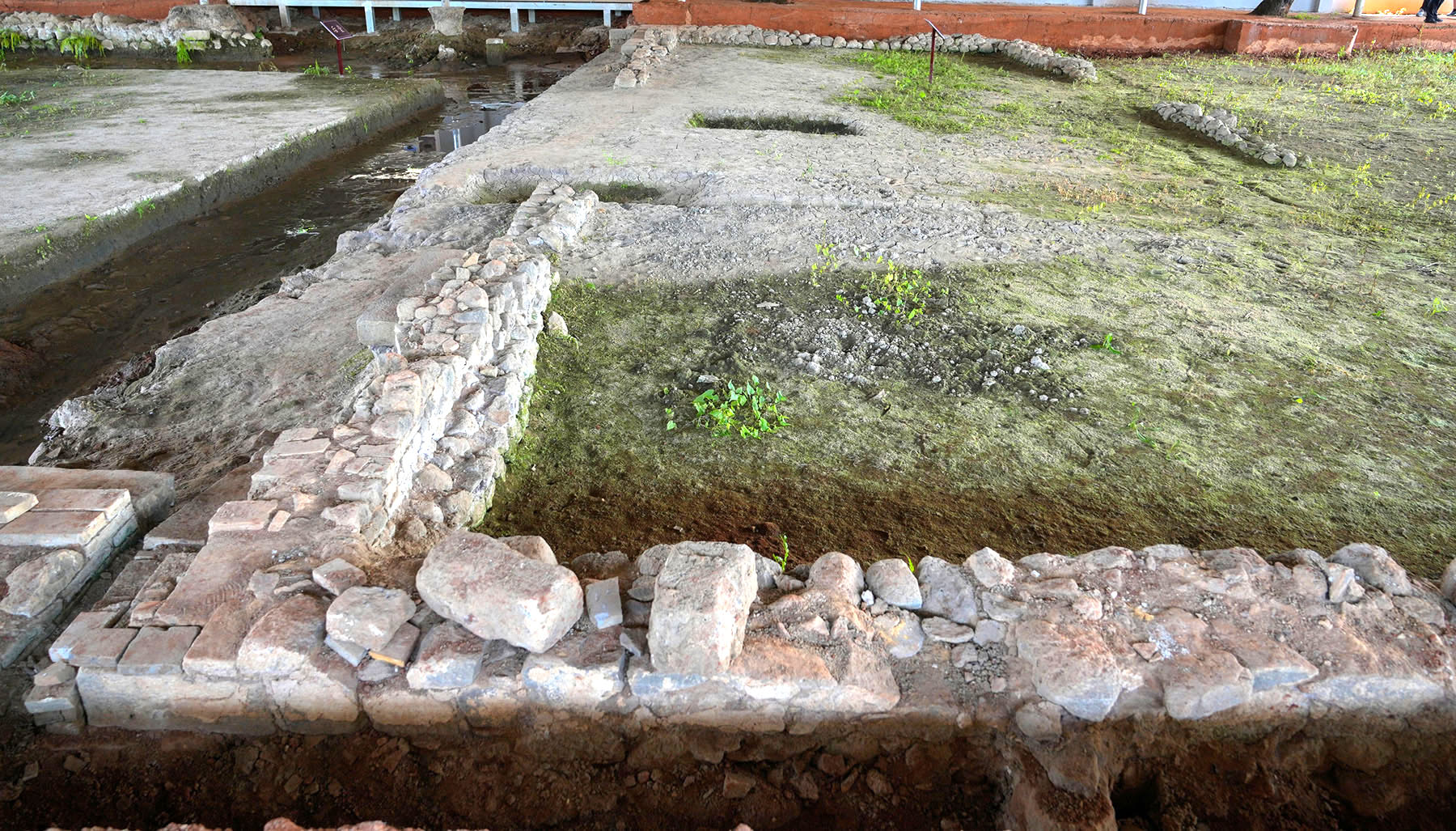Writer, statesman and gourmet remains a celebrated figure of inspiration, Chen Bowen reports in Danzhou, Hainan.

Nearly a millennium after his death, the legacy of Su Shi, China's beloved writer, statesman and gastronome, continues to thrive on the tropical island of Hainan province.
Exiled to the island in the summer of 1097 during the political turmoil of the Song Dynasty (960-1279), the then-60-year-old scholar spent his final years transforming adversity into cultural triumph. Today, his name adorns museums, culinary staples and blockbuster theater shows, cementing his status as Hainan's most enduring "celebrity".
When Su, also known as Su Dongpo, after his courtesy name, arrived in Dan'er, today's Danzhou city, Hainan was a remote frontier, far removed from the intellectual hubs of central China. Yet over three years, the polymath penned 170 poems and 160 essays, and completed his famed Commentary on the Book of Documents, Commentary on the Book of Changes and Explanations on the Analects of Confucius. He introduced agricultural techniques, promoted education, and prescribed herbal remedies, leaving an imprint so profound that locals still affectionately call him "one of our own".
READ MORE: Poets urged to catch up with times in new era
"I am but a native of Dan'er, who happened to be born in Sichuan," Su once wrote, a line now etched into the collective memory of Hainan.
"The fact that Hainan, an island once considered remote, could nurture a cultural legacy that profoundly influenced the rest of China speaks volumes about its people's character," says Leng Chengjin, a professor at Renmin University of China.
"Had the residents of Danzhou not shown such exceptional warmth and moral integrity, Su's three-year exile here would never have yielded such enduring cultural contributions," Leng notes, emphasizing how local hospitality helped transform the scholar's hardship into a creative renaissance.
Following the ongoing fourth national census of cultural relics, Hainan has systematically cataloged its cultural heritage linked to Su Dongpo, identifying 13 cultural heritage sites related to the historical figure, according to province authorities.
Long before notions of equality became modern ideals, Su practiced them in the back roads of Hainan.
The statesman embraced the island's indigenous Li ethnic people with his philosophy that "Han and Li ethnics share one humanity", a radical view in ancient China. Eyewitness accounts describe local children giggling "Uncle Dongpo!" as he wandered mountain paths.
At the newly opened Guanglang Temple Memorial Hall, which recreates his exile's pivotal site, visitors trace Su's footsteps through exhibitions with poetic titles such as Life Is Like a Journey, Wringing My Scarf, Inviting Drunken Friends and Boundless Spring Winds from the Sea.
The exhibits showcase his impact on local customs, farming and ethnic unity. The site, built near the ruins of Su's thatched hut, features Song Dynasty-style architecture and replanted groves of arenga westerhoutii trees, recreating the landscape he described in verse: "Bamboo shadows dance in the morning light; this humble fence holds my boundless delight."
In Chinese, arenga westerhoutii trees were called guanglang, explaining the origin of the name of the temple.
"We've reconstructed Su's daily life here based on historical records," says Sheng Yun, deputy general manager of the Danzhou Tourism and Culture Investment Development Group, pointing to the newly planted grove of arenga westerhoutii trees and thatched-roof structures at the memorial hall.
Archaeologists also spent two years excavating the original site, unearthing more than 20 artifacts, including Song Dynasty ceramics and coins.

Su's letters to his son Su Mai reveal a man who found joy even in hardship, particularly through food. "The locals call these 'oysters'," he wrote in a playful note. "Roast them in coals — divine! But tell no northerners, lest they swarm here."
Modern Danzhou has embraced this gastronomic heritage. At eateries like Sicheng Restaurant, chef-owner Peng Dingshan says, "I started reconstructing Su Dongpo's exile recipes in 2011 — half archaeology, half storytelling."
Peng's notebooks bulge with centuries-old cooking references and local oral histories. Su Shi's signature dishes — including the yam-based porridge and Dongpo Pork, or red-braised pork belly — now account for the majority of sales at this bustling storefront.
Peng has created a culinary tribute to the poet, blending history and local flavors in his Dongpo Tofu Trio — a dish inspired by the scholar's legendary introduction of beancurd techniques to Hainan. Each element of the trio symbolizes a phase of Su Shi's political exile during Song Dynasty, intertwining his story with regional ingredients.
The dish includes yellow egg tofu, crafted from Hainan-grown soybeans, representing his first exile from 1079 to 1084 in Huangzhou, today in Hubei province. Green wampee fruit tofu nods to his documented botanical explorations during his banishment to Huizhou (in present-day Guangdong province) from 1094 to 1097. The third component, black sesame tofu, evokes the hardship — and eventual hope — of his final exile in Danzhou (today's Hainan province) from 1097 until his departure in 1100. Since its debut, the dish has become a bestseller.
"We're not just cooking meals," Peng says. "We're trying to tell his story."
An immersive Song Dynasty academy-themed cultural performance, Heartthrob Dongpo, made its debut on Dec 8, 2024, in Danzhou, offering visitors a unique time-travel experience into the poet's legendary life.
The production blends dance, poetry recitals, music and situational skits to create an interactive cultural tourism experience. Set in the Dongpo Academy, the performance weaves historical narratives into real-life scenery, bridging past and present.
Playwright Sun Qinglai says visitors assume the role of the scholar's "students "upon entering the tourist site, immersing them in his three-year stay in Hainan. Through guided performances, attendees become both spectators and active participants in the story.
The play highlights the poet's interactions with local figures like his friend Li Ziyun and his student Jiang Tangzuo, portraying him as a literary genius, a food lover and a charismatic official. A key scene recreates a historic gathering in the academy's Zaijiutang (the wine-drinking hall), which was built as a lecture hall to meet with students and disciples during the three years he spent in Danzhou, with live actors mirroring statues of Su Shi and his companions.
Audience Sun Qihang, who became one of Su's "disciples", praises the experience: "You can recite poetry with 'Dongpo' and even receive a 'diploma' from him — it's incredibly engaging."
The show concludes with a collective recitation of Su Shi's emotional farewell poem, Farewell to the People of Hainan.
Actor Bi He notes Su Shi's lasting impact on Hainan: "From the Song to Qing dynasties, Hainan produced 96 jinshi members, or the scholars who stood out in the nation's highest-level imperial exams. Many were influenced by Su Shi, who helped shape the island's scholarly traditions."

Now a series of performances celebrating the life and legacy of Su Shi are captivating audiences in Hainan, further enriching the island's cultural tourism scene. The productions include dance drama Dongpo Hainan, depicting his exile and contributions to the region, stage play Zaijiu Dongpo, focusing on his scholarly exchanges in Hainan, musical poetry drama The Ageless Dongpo and This Peaceful Place Is Home, blending music, dance, and verse. Remembering Su Shi's Youth introduces younger generations to his early years.
On May 18, International Museum Day, the Hainan Museum unveiled a new virtual reality exhibition, Meet Su Dongpo, Live Like Him. Running to April 24, 2026, the exhibition recreates eight key scenes from Su's life, blending his poetry, traditional Chinese landscapes and historical settings.
Through cinematic storytelling, the 25-minute immersive experience aims to present a vivid, multidimensional portrayal of the literary giant, offering audiences a chance to "travel back" to the Song Dynasty and engage in a cross-temporal dialogue with the legendary figure.
The exhibition is "not just a tribute to the ancient sage, but also a way to deepen Hainan's cultural roots", says Wang Huishan, deputy director of Hainan Museum.
He expresses the hope that the immersive experience would transform visitors from "spectators into participants", allowing them to draw inspiration from the poet's resilience and reinterpret traditional culture for the modern era.
"This dialogue across time," he adds, "can help people find strength in adversity — just as Su Shi did".
Hainan's three-year action plan for the preservation and utilization of Su Shi's cultural heritage (2024-2026), issued on May 11,2024, aims to weave his legacy into modern tourism. Projects include upgrading Dongpo Academy to a national top-rated tourist area, restoring Danzhou city's ancient town, and launching an ecological park at Mount Dan'er, a site the poet once visited — all part of a bid to make Hainan a global hub for Song Dynasty culture.
Li Gongyu, vice-secretary of the China Su Shi Research Association and director of the Hainan Su Shi Research Association, says that Su Shi's three-year exile in Hainan represented both the nadir of his political career and the pinnacle of his intellectual achievements.
"While these were the most politically marginalized and materially difficult years of Su Shi's 40-year career, they also marked his highest philosophical and scholarly attainment," Li notes.
"His philosophy — finding contentment wherever life takes him — still speaks to us," says historian Han Guoqiang.
Hainan province has hosted the China (Hainan) Dongpo Cultural Tourism Conference annually since 2023, celebrating the enduring legacy of the iconic Song Dynasty literatus.
In 2024, Danzhou Dongpo Cultural Tourism Zone drew 597,900 visitors, a testament to his timeless appeal, according to Danzhou's Bureau of Tourism, Culture, Radio, Television and Sports.
ALSO READ: New museum in Hainan to offer visual feast in art show
To either side of the grounds of the Dongpo Academy are two distinctively shaped courtyards known as the East and West Gardens. The well in the east courtyard is said to have been dug by the poet himself. Already more than 900 years old, the well has never run dry.
Although the Dongpo Academy and Guanglang Temple site have experienced wind and rain, local people, out of admiration for Su Shi, have kept it in good condition over time.
As dusk falls over the arenga westerhoutii trees, it's clear: Su Shi's journey didn't end in Hainan. It became a bridge across centuries — one that still carries the weight of his laughter, his recipes and his unyielding love for this "land of boundless spring".
Contact the writer at chenbowen@chinadaily.com.cn


